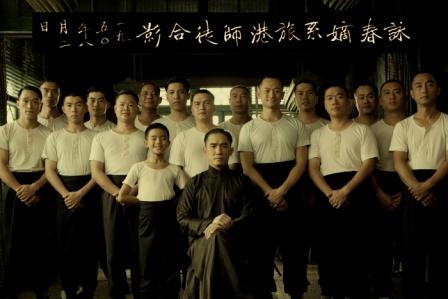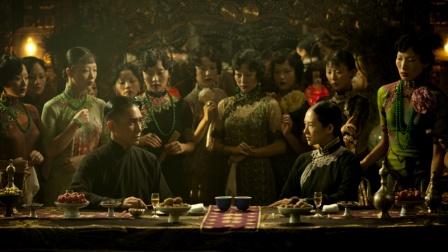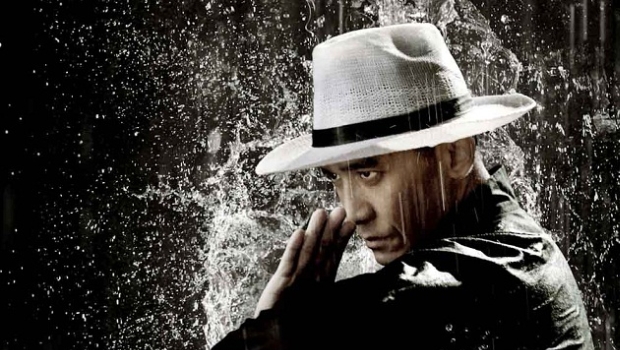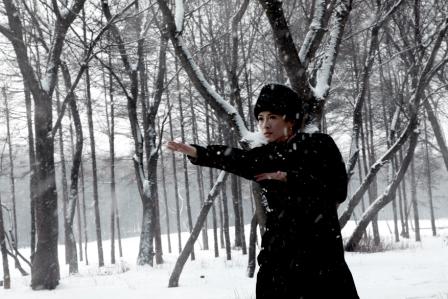Rating: ★★★★★
Hong Kong auteur Wong Karwai’s new film The Grandmasters started 2013 with a bang. It not only marks Wong’s return to Chinese-language films, but more importantly, celebrates the maturest work of the director so far. For any Wong Karwai fan, the comeback of the old and familiar Wong cinema is good news.
The Plot
Before The Grandmasters, there were already two famous Yip Man movies. IP Man and its sequel, both directed by Wilson Yip and star Kung Fu actor Donnie Yen, showered with success in box office. There are even rumors that Wilson Yip wanted the name “The Grandmasters” for his first film, but after coordinations, Wong kept the name.
If you study the plot of two IP Man films and The Grandmasters, there is one major difference, which can be reflected from the names of the movies. IP Man is all about the leading character Yip Man, while The Grandmasters is about many kung fu masters especially another female kung fu practitioner – Gong’er. Yip Man is just a character who helps interweave the story-line.
The story of the two IP Man films are mainly about how Yip Man fights against Japanese invaders as a patriotic figure. While The Grandmasters is more about Gong’er’s revenge and her love story with Yip Man. Anyone who has seen Wong’s In the Mood for Love will recall the resemblance between the two love stories. Both are doomed relations, only for different reasons.
Wong Karwai intended to make The Grandmasters an epic film which could even be entitled “Once Upon a Time in ROC”. He told the media that the director’s cut will be 4 hours long, but the theatrical version only lasts 125 minutes. This results in a confusion in some of the scenes, for example, many audiences are completely lost with the weird barbershop scene. Let’s hope we can have the director’s cut version in the future Blu-ray release.
———————————————————————————————————————————————
The Cinematography
After Wong’s departure from his regular cinematographer Christopher Doyle, it seems that he has lost the magic in his unique cinema. Fans wondered if he could still shoot something as beautiful as Ashes of Time and In the Mood for Love. The Grandmasters solved the puzzle, Wong can still make an aesthetically-appealing film without Doyle. The two cinematographer Philippe Le Sourd and XiaoFei Song did an amazing job. This film is a visual treat from start to finish, and brings back the Wong style images we are so familiar with.
In the first 80 minutes of the film, action sequences take a big part. The first one happens in a rainy night and the second takes place on a railway station platform in a snowy night. The rain and snow are so beautifully captured that they definitely add some Chinese aesthetic feelings to the actions. The action sequence was shot with well-adjusted but abrupt change of pace, especially those slow motion actions that you rarely see in any kung fu films before.
The last 40 minutes return to the typical Wong Karwai love story. The color and the lighting brings the viewers a nostalgic feeling that so much resembles that in Days of Being Wild and In the Mood for Love. The close-up of Zhang Ziyi’s face during the last meeting between Gong’er and Yip Man is the best moment of the film.
———————————————————————————————————————————————
The Score
Wong brought back Japanese composer Shigeru Umebayashi, who has worked with him in In the Mood in Love and 2046. Shigeru’s scores for those action sequences are pitch-perfect in terms of pace: drums and beats are synchronous with the moves. Many of the early scenes took place in a whorehouse and some of the brilliant Peking Opera songs were chosen here. In the climax scene, the music was so subtle, moving,and emotional. The most surprising part is the use of the main theme of Ennio Morricone’s score for Once Upon a Time in America, which is another brilliant decision.
———————————————————————————————————————————————
The Performances
Unlike Donnie Yen, who played Yip Man in the two IP Man movies, Tony Leung knew nothing about kung fu before acting in The Grandmasters. But after several months’ hard training, he not only looked like a kung fu master but also demonstrated some expertise in martial arts. Zhang Ziyi gave her best performance to date in this film: it was hard for an actress to convince the audiences that she had some real kung fu, but she did it. Her fight with Ma San on the railway station platform is equally spectacular as the opening rain fight sequence. In Gong’er’s last meeting with Yip Man, Zhang Ziyi expressed her regret with her looks and tears. Watching that scene, and you will marvel: her acting deserves her prestige!
———————————————————————————————————————————————
The Dialogues
Wong Karwai’s movies always left us some unforgettable quotes, and this film is no exception. These quotes are short but profound, so they are easy to remember but take time to digest. Most of them imply laws in the competitive kung fu world and suggest philosophy in life as well.
———————————————————————————————————————————————
At last, we all need to thank Wong Karwai for another piece of art he has created with patience, honesty and craft. Time will prove that The Grandmasters will become a classic just as many of his former works.
Read other The Grandmasters and Wong Karwai related posts
Wong Karwai and The Grandmasters, Why It Took So Long?
Wong Kar-wai’s Top 20 Chinese-language Films
Top 20 Classic Wong Karwai Movie Quotes



